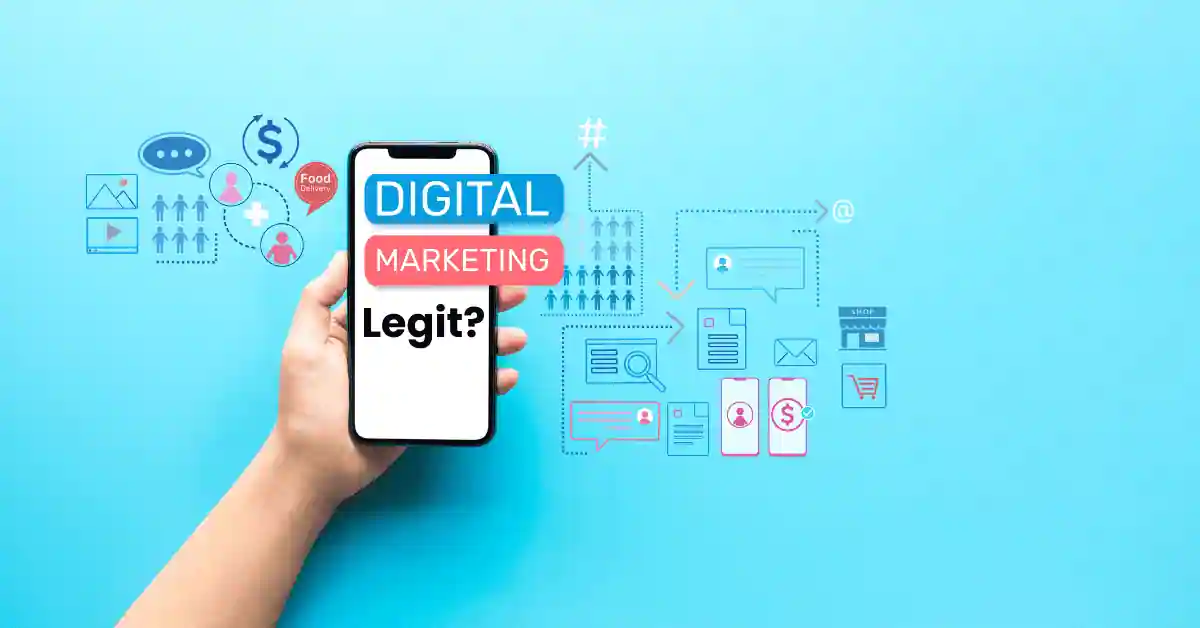Imagine trying to sell lemonade in a snowstorm—sounds ridiculous, right? That’s what marketing without a digital strategy feels like in today’s world. So, is digital marketing legit? Spoiler alert—it’s not just legit; it’s essential. Whether you’re a small business owner or a seasoned entrepreneur, understanding the ins and outs of digital marketing can transform your business.
In this blog, we’ll break down the myths, reveal the truths, and show you why digital marketing is a game-changer for anyone aiming to thrive in 2024.
What Is Digital Marketing?
Digital marketing refers to promoting products or services using digital channels, including websites, social media, email, and search engines. It’s a far cry from the traditional billboards and TV commercials.
The journey began in the late 1990s when businesses realized the internet was more than just a fad. Today, digital marketing encompasses everything from SEO to influencer partnerships on Instagram.
Key Entities:
1. SEO (Search Engine Optimization)
Definition:
SEO is the process of optimizing a website to rank higher on search engine results pages (SERPs) like Google. The goal is to increase organic (unpaid) traffic by making your website more visible to people searching for relevant keywords.
Key Elements:
- On-Page SEO: Optimizing individual web pages (e.g., using the right keywords, meta tags, and internal linking).
- Off-Page SEO: Building authority through backlinks from other reputable websites.
- Technical SEO: Ensuring your website is fast, mobile-friendly, and easy for search engines to crawl.
Why It’s Important:
Over 70% of clicks go to the first five results on Google. A solid SEO strategy puts your business in those coveted spots, driving traffic and increasing credibility.
2. PPC (Pay-Per-Click)
Definition:
PPC is a paid advertising model where advertisers pay each time someone clicks on their ad. These ads can appear on search engines, social media, or websites.
Key Platforms:
- Google Ads: Displays ads at the top of Google search results.
- Facebook Ads: Targets specific audiences based on demographics and interests.
- LinkedIn Ads: Ideal for B2B businesses targeting professionals.
Why It’s Important:
PPC offers immediate visibility and is highly measurable. You can track every dollar spent and optimize campaigns to ensure a positive ROI.
3. Content Marketing
Definition:
Content marketing focuses on creating and distributing valuable, relevant content to attract and engage a target audience. The goal isn’t direct selling but building trust and authority.
Common Formats:
- Blogs: Educational articles that solve problems or answer questions.
- Videos: Explainer videos, tutorials, or testimonials.
- Ebooks and Whitepapers: In-depth resources that demonstrate expertise.
- Infographics: Visual representations of data or processes.
Why It’s Important:
Content marketing establishes your brand as a thought leader. It also plays a crucial role in SEO, as search engines prioritize valuable content.
4. Email Marketing
Definition:
Email marketing involves sending targeted messages directly to potential or existing customers to nurture leads or drive sales.
Types of Email Campaigns:
- Newsletters: Regular updates about your business, industry insights, or tips.
- Promotional Emails: Announcements about sales, discounts, or new products.
- Drip Campaigns: A series of automated emails triggered by user behavior (e.g., signing up or abandoning a cart).
Why It’s Important:
With an ROI of $36 for every $1 spent, email marketing remains one of the most cost-effective digital marketing strategies.
5. Social Media Marketing
Definition:
This involves promoting your brand and engaging with your audience on social media platforms like Facebook, Instagram, Twitter, LinkedIn, and TikTok.
Strategies Include:
- Content Posting: Sharing regular updates, images, and videos.
- Paid Ads: Running targeted campaigns for brand awareness or sales.
- Community Engagement: Interacting with followers through comments, polls, and live sessions.
Why It’s Important:
Social media offers a direct way to connect with your audience. It’s especially useful for building brand loyalty and driving website traffic.
6. Affiliate Marketing
Definition:
Affiliate marketing is a performance-based strategy where businesses reward affiliates (individuals or companies) for driving traffic or sales through their referral links.
Key Players:
- Merchants: Businesses offering products or services.
- Affiliates: Individuals or websites promoting the merchant’s products.
- Consumers: People who purchase through affiliate links.
Why It’s Important:
Affiliate marketing leverages third-party marketers to expand reach without upfront advertising costs.
7. Influencer Marketing
Definition:
Influencer marketing involves partnering with individuals who have a significant social media following to promote your brand or products.
Types of Influencers:
- Mega-Influencers: Celebrities with millions of followers.
- Micro-Influencers: Niche experts with smaller but highly engaged audiences.
Why It’s Important:
Consumers trust influencers more than traditional ads. Collaborations can boost brand awareness and credibility.
8. Web Analytics
Definition:
Web analytics involves tracking and analyzing user behavior on your website to understand performance and improve strategies.
Popular Tools:
- Google Analytics: Offers detailed insights into traffic, demographics, and user behavior.
- Hotjar: Visualizes user interactions through heatmaps.
Why It’s Important:
Analytics help you measure the effectiveness of your marketing efforts and make data-driven decisions.
The Legitimacy of Digital Marketing
Why Some People Doubt Its Effectiveness
Let’s address the elephant in the room: why do some people think digital marketing doesn’t work?
- Unrealistic Expectations: Many believe digital marketing delivers overnight success. It doesn’t. It’s a long-term strategy.
- Scams: Fake agencies promise instant results, damaging trust in the industry.
- Poor Execution: Businesses with no clear strategy often waste money on ineffective campaigns.
The Proof Is in the Numbers
Still skeptical? Here’s the data:
- Businesses using digital marketing report 122% ROI compared to traditional methods.
- Over 75% of U.S. adults purchase products after seeing them online.
Take small businesses, for example. A local pizza shop in Texas increased its monthly revenue by 40% using Instagram ads alone!
Benefits of Digital Marketing
Visibility and Reach: Go Big or Go Home
With billions of people online, digital marketing is your gateway to reaching them. Imagine being a small-town boutique with customers from across the country—sounds dreamy, right?
By optimizing for SEO, your website can appear on the first page of Google, where 93% of users make their clicks.
Cost-Effectiveness: Bang for Your Buck
Ever priced a TV commercial? It’s expensive! In contrast, digital campaigns cost less and offer better returns. For as little as $5 a day, you can run effective Facebook Ads targeting your ideal audience.
Real-Time Engagement: Chat With Your Audience
Social media platforms like Instagram and TikTok allow businesses to interact directly with customers. Whether it’s replying to comments or running polls, engagement drives brand loyalty.
How to Spot Digital Marketing Scams
Red Flags to Watch Out For
Not all that glitters is gold. Some marketers promise the moon but deliver peanuts. Watch out for these:
- Guarantees of instant results—organic growth takes time.
- Agencies that refuse to share metrics or reports.
- Suspiciously low prices—if it sounds too good to be true, it probably is.
Choosing Legit Digital Marketers
Before hiring anyone, ask these questions:
- What’s your experience in my industry?
- Can you share previous case studies?
- What tools do you use to track progress?
Always check reviews on platforms like Google My Business and Clutch.co for added assurance.
Getting Started With Digital Marketing
DIY or Hire a Pro?
Should you go solo or call in the experts? Here’s the lowdown:
- DIY: Perfect for tight budgets. Tools like Canva (for design) and Google Analytics (for tracking) make it easier.
- Hire Pros: Ideal for scaling. Agencies bring expertise and save you time.
Creating Your First Campaign
Want to dip your toes in? Start small with a Facebook Ad:
- Define your goal (e.g., website traffic).
- Select your audience (age, interests, location).
- Launch the ad and monitor its performance using Facebook’s Ad Manager.
Real Stories: Businesses Thriving With Digital Marketing
Take Jones Coffee House in California. Facing stiff competition, they used Instagram Stories to showcase their unique brews. The result? A 30% sales increase within three months.
Another example is a local fitness coach who used TikTok to share workout tips, growing his follower base from zero to 50,000 in just six weeks.
Conclusion
Digital marketing is no longer an option; it’s a necessity. Whether you’re a solopreneur or running a large corporation, it has the tools to elevate your business.
Start small, stay consistent, and watch the magic happen. Because yes, digital marketing isn’t just legit—it’s transformative.
FAQs
1. Is digital marketing legit?
Yes, digital marketing is a legitimate and highly effective way to promote businesses online. With strategies like SEO, social media marketing, and email campaigns, businesses can reach targeted audiences, boost brand awareness, and drive measurable results.
2. How does digital marketing differ from traditional marketing?
Digital marketing focuses on online channels such as websites, social media, and email, offering precise targeting and real-time analytics. Traditional marketing uses offline methods like TV, radio, and print, which can be harder to track and less personalized.
3. How long does it take to see results with digital marketing?
Results depend on the strategy. PPC campaigns can deliver immediate traffic, while SEO and content marketing may take 3–6 months to show significant improvements. Consistency and optimization are key to long-term success.
4. Do I need a big budget for digital marketing?
Not necessarily. Digital marketing offers scalable options for all budgets. For example, small businesses can start with organic social media and SEO, while larger companies might invest in paid ads and advanced tools.
5. What skills are essential for digital marketing success?
Key skills include SEO knowledge, data analysis, content creation, social media management, and familiarity with tools like Google Analytics and Ad platforms. Creativity, adaptability, and communication are also important.






